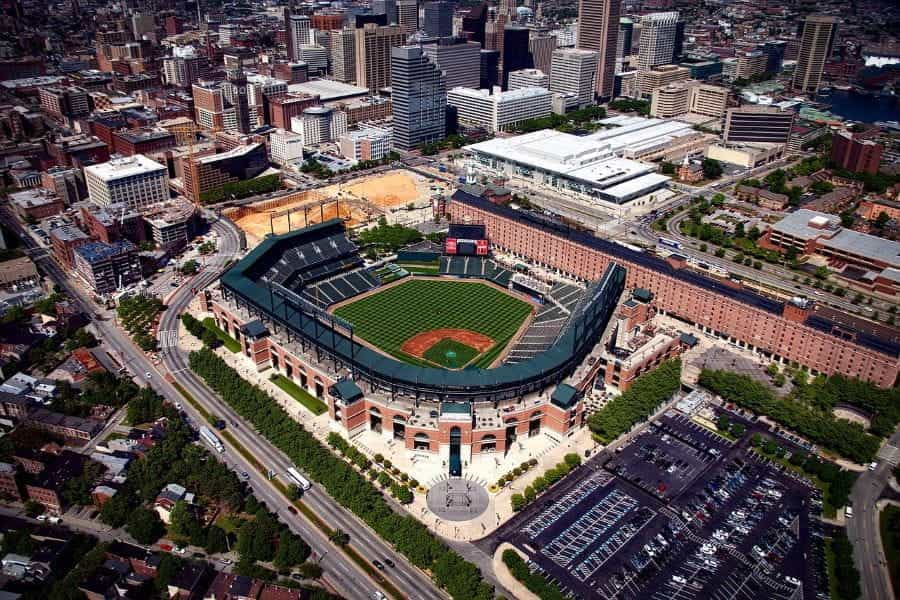Vote Set For Maryland Sports Betting Bill
The Maryland Senate has pushed forward a heavily amended bill to legalize sports betting in the state, giving voters the chance to approve it this year. While the details of how sports betting will work still need to be determined, lawmakers progressed the bill before the closing of the session due to coronavirus.

Maryland’s Senate has approved of a stripped-back bill to put sports betting to a public referendum, with the vote set to take place in November. ©tpsdave/Pixabay
The bill passed with unanimous support, with the Maryland Senate voting 47-0 on changes that the House were instructed to make the previous day. The House’s amendments to S 4 saw the removal of all language from Page 2 through 25, it’s final page.
Bill S 4 was passed by the House on a vote of 129-3 in an effort to guarantee it would face a legislative referendum this year. If Maryland residents pass the referendum in November, another bill will need to be authored that determines how sports betting will operate, including how it will be taxed.
The revised bill was stripped of all details on who will be allowed to operate a sportsbook in Maryland. Previously, the bill stated that sportsbooks could be established at the state’s casinos, racing tracks, the State Fairgrounds and a new potential stadium that may be built for the NFL’s Washington Redskins.
Before details on who can operate a sportsbook are determined, the House added a stipulation that a Minority Business Enterprise disparity study would need to be carried out. This requires the Maryland Department of Transportation and the state Gaming Control Commission to author a study on how minorities will be impacted by the industry.
Delegate Nick Mosby, who oversaw the expunging of the operator specifications, did so over concerns that the bill would have “compounded the concentration of wealth” by awarding betting licenses only to the “rich white men” who already were benefiting from the gaming industry.
It is likely Mosby’s action is a response to what happened when medical cannabis was legalized in the state. After it was realized most licenses awarded to sell cannabis were given to non-minorities, a disparity study confirmed that minorities were at a disadvantage in applying for licenses.
In response, the Assembly later created another round to help award licenses to minority-owned businesses that gave extra points in the application process to minorities. However, these licenses are still yet to be awarded, highlighting the struggles these parties face when against larger, wealthier competition.
Other aspects of the bill that were cut include a tiered structure that set initial license fees from between $1.5 million to $2.5 million that would be renewable every five years for 25% of that cost. Sports betting would have been taxed at 20%, and licensees would be able to offer both in-person sports betting in addition to an online service.
Lawmakers React to Changes
Some lawmakers have voiced their disappointment at the heavy cuts to the language, with Senate President Bill Ferguson saying although they tried their best, the bill as it stands doesn’t do much. In response, the bill’s author Senator Craig Zucker expressed his belief that calling a referendum now was the right move.
“Well, it needed to go to referendum to approve sports betting and that will happen. Assuming the voters approve it, then we will be allowed to do it. We had a bill that did both that and a whole implementation program. The House would not agree to that implementation program, so we’re going to have to go back and have that discussion again.”– Craig Zucker, Senator, Maryland Legislature
Senate Minority Leader J.B. Jennings outlined that if voters did approve of legalizing sports betting in November, the legislature’s return in January could mean that there is only a two-month delay in launching. The extra time would give lawmakers a chance to decide on things like whether to allow betting on college sports and integrity fees.
Delegate Michele Guyton voiced support for the amendments to help minorities, though added she was worried the Maryland State Fair may lose its opportunity for a license. With less than 1,000 video lottery terminals currently at the racetrack, the Fairgrounds is one of the smaller contenders for a license.
The referendum question for sports betting will appear as: “Do you favor the expansion of commercial gaming in the State of Maryland to authorize sports and event betting for the primary purpose of raising revenue for education?” It is likely that the reference to education will boost its chances of passing.
Like many other states, Maryland’s gaming industry is currently frozen after Governor Larry Hogan as a measure to reduce nonessential public gatherings in the wake of the coronavirus. The order has listed no end date for the mandate, leaving the entire gaming and hospitality industry in limbo until a further announcement.



